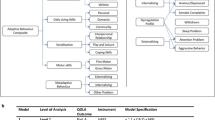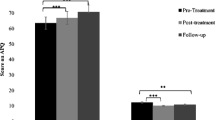Abstract
Objective
To examine the effect of parental training on disturbed behavior of early childhood cases presented to the pediatricians.
Methods
The patients who reported in pediatric OPD of the Himalayan Institute of Medical Sciences, Dehradun, with complaints of low learning, poor memory, vertigo, speech problem, stress, headache, depression, adjustment problems, aggression, and hostile behavior were included in the study. Children aged 3 through 6 (N = 60), were screened through PBQ (Preschool Behavior Questionnaire), DST (developmental screening Test), and Vineland Social Maturity Scale (VSMS). Children included in the study had an average range of developmental quotient 85–90 (mean DQ = 87.5). Range of social quotient was 40–45 (mean SQ = 42.5). Twenty four fortnightly sessions of ‘parental training’ using the model of ‘Mindful Parenting’ were conducted. Single group t test method was applied in order to see the difference in mean of pre and post assessment of PBQ.
Results
After concluding parental training (after 24 sessions), mean difference of total disturbed behavior was found to be significant (t value: 5.31 > .05) Similarly, the mean difference of hostile/aggressive behavior (t value: 10.2 > .05), anxious behavior (t value: 18.5 > .05), and hyperactive/distractible behavior (t value: 1.97 > .05) were found to be significant.
Conclusions
These results provide some evidence in favor of parental training in managing behavioral problems occurring in early childhood. Instead of putting the child immediately on medication, parents can get training and prepare a plan to understand and make a change in child’s behavior leading to better health.


Similar content being viewed by others
References
Lewit E, Baker L. School readiness. Future Child. 1995;5:128–39.
Erimm-Kaufman S, Pianta R, Cox M. Teachers’ judgments of problems in the transition to kindergarten. Early Child Res Q. 2000;15:147–66.
Keenan K, Shaw D, Delliquadri E. Evidence for the continuity of early problem behaviors: application of a developmental model. J Abnorm Child Psychol. 1998;26:441–52.
Shaw DS, Gilliom M, Ingoldsby EM. Trajectories leading to school-age conduct problems. Dev Psychol, Special issue: Violent Children. 2003;39:189–200.
Suveg C, Southam-Gerow MA, Goodman KL. The role of emotion theory and research in child therapy development. Clin Psychol Sci Pract. 2007;14:358–71.
Visser SN, Lesesne CA, Perou R. National estimates and factors associated with medication treatment for childhood attention-deficit/hyperactivity disorder. Pediatrics. 2007;119:99–106.
Gleason MM, Egger HL, Emslie GJ, et al. Psychopharmacological treatment for very young children: contexts and guidelines. J Am Acad Child Adolesc Psych. 2007;46:1532–72.
National Scientific Council on the Developing Child. Mental health problems in early childhood can impair learning and behavior for life: working paper #6. 2008; http://www.developingchild.net.
Behar L, Stringfield S. Manual for pre school behavior questionnaire. 1st ed. Durham: Lenore Behar; 1974.
Duncan LG, Coatsworth JD, Greenberg MT. A model of mindful parenting: implications for parent–child relationships and prevention research. Clin Child Fam Psychol Rev. 2009;12:255–70.
Phillips EL, Kollins S, Edgerly D. Behavioural assessment of children and adolescents. Indian J Pediatr. 1999;66:389–99, PubMed PMID:10798087.
Hirisave U, Shanti K. Scholastic difficulties with behavioural problems. Indian J Pediatr. 2002;69:963–4, PubMed PMID: 12503661.
Dreikurs R. Coping with children’s misbehavior, a parent’s guide. New York: Hawthorn Books; 1972.
Prinzie P, Stams GJJM, Dekovic M, Reijintjes AHA, Belsky J. The relations between parents’ Big Five personality factors and parenting: a meta-analytic review. J Pers Soc Psychol. 2009;97:351–62.
Baer RA, Krietemeyer J. Overview of mindfulness- and acceptance-based treatment approaches. In: Baer RA, editor. Mindfulness-based treatment approaches. Burlington: Elsevier Academic Press; 2006. pp. 3–27.
Brown KW, Ryan RM. The benefits of being present: mindfulness and its role in psychological well-being. J Pers Soc Psychol. 2003;84:822–48. doi:10.1037/0022-3514.84.4.822, [PubMed].
Kabat-Zinn J. Wherever you go there you are: mindfulness meditation in everyday life. 1st ed. New York: Hyperion; 1994. ISBN 1562827693.
Kabat-Zinn J. An outpatient program in behavioral medicine for chronic pain patients based on the practice of mindfulness meditation: theoretical considerations and preliminary results. Gen Hosp Psychiatry. 1982;4:33–47. doi:10.1016/0163-8343(82)90026-3, [PubMed].
Segal ZV, Williams JMG, Teasdale JD. Mindfulness-based cognitive therapy for depression. 1st ed. New York: The Guilford Press; 2002. ISBN 1572307064.
Linehan MM. Cognitive behavioral treatment of borderline personality disorder. NewYork: Guilford Press; 1993. ISBN 0898621836.
Hayes AM, Feldman G. Clarifying the construct of mindfulness in the context of emotion regulation and the process of change in therapy. Clin Psychol Sci Pract. 2004;11:255–62. doi:10.1093/clipsy/bph080.
Hayes SC, Strosahl K, Wilson KG. Acceptance and commitment therapy. New York: Guilford Press; 1999.
Brantley J. Mindfulness-based stress reduction. In: Orsillo SM, Roemer L, editors. Acceptance and mindfulness-based approaches to anxiety: conceptualization and treatment. Series in anxiety and related disorders. New York: Springer; 2005. pp. 131–45.
Carlson LE, Speca M, Patel KD, Goodey E. Mindfulness-based stress reduction in relation to quality of life, mood, symptoms of stress, and immune parameters in breast and prostate cancer outpatients. Psychosom Med. 2003;65:571–81. doi:10.1097/01.PSY.0000074003.35911.41, [PubMed].
Roemer L, Orsillo SM. An open trial of an acceptance-based behavior therapy for generalized anxiety disorder. Behav Ther. 2007;38:72–85. doi:10.1016/j.beth.2006.04.004, [PubMed].
Ma SH, Teasdale JD. Mindfulness-based cognitive therapy for depression: replication and exploration of different relapse prevention effects. J Consult Clin Psychol. 2004;72:31–40. doi:10.1037/0022-006X.72.1.31, [PubMed].
Bowen S, Witkiewitz K, Dillworth TM, et al. Mindfulness meditation and substance use in an incarcerated population. Psychol Addict Behav. 2006;20:343–7. doi:10.1037/0893-164X.20.3.343, [PubMed].
Hastings PD, Grusec JE. Parenting goals as organizers of responses to parent–child disagreement. Dev Psychol. 1998;34:465–79. doi:10.1037/0012-1649.34.3.465, [PubMed].
Smetana JG, Metzger A, Gettman DC, Campione-Barr N. Disclosure and secrecy in adolescent-parent relationships. Child Dev. 2006;77:201–17. doi:10.1111/j.1467-8624.2006.00865.x, [PubMed].
Acknowledgments
This research study would not have been possible unless our clients had supported us, specially the children, who with their loving and emerging smiles reinforced us to continue this research. We are greatly obliged to Larissa G. Duncan, J. Douglas Coatsworth, and Mark T. Greenberg for granting open access to use “Mindful Parenting” model for this study. We also pay our regards to Lenore Behar and Samual Stringfield for PBQ, Dr. J. Bharath Raj for DST, and Dr. A.J. Malin for VSMS. We are indebted to many of our colleagues to support us thought-out this work. At the last but not the lest, we would like to show our gratitude to the librarians, all other staff members of the department and authors of citied references who directly are indirectly helped us in this work.
Contributions
M S; Planning and designing of the study paper, assessment and conduction of parental training program. Assistance in statistical analysis report preparation and writing the paper, AG and BPK; Helped in planning the study paper, initial assessment and referral of the cases to the Psychiatry OPD for study, UT and VL; Helped in planning the study paper and initial assessment.
Conflict of Interest
None.
Role of Funding Source
None.
Author information
Authors and Affiliations
Corresponding author
Rights and permissions
About this article
Cite this article
Srivastava, M., Gupta, A., Talukdar, U. et al. Effect of Parental Training in Managing the Behavioral Problems of Early Childhood. Indian J Pediatr 78, 973–978 (2011). https://doi.org/10.1007/s12098-011-0401-5
Received:
Accepted:
Published:
Issue Date:
DOI: https://doi.org/10.1007/s12098-011-0401-5




